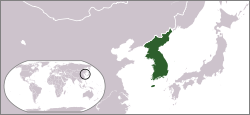
This week: Korea.
Asian Perspective - Volume 32 - Number 4 - 2008 Special issue on North Korea and Regional Security Guest Editor: Mark J. Valencia
Arms Control Today, North Korea Nuclear Test Focus , November 2006.
Because the Rozman and Lee piece does not focus on the North Korean nuclearization issue directly, but instead is concerned with the ROK-Japan relationship, I will start with it. I found it very helpful, because all too often we in the US focus on our own bilateral relationships at the expense of the relationships between our allies. It does not shock me that rising nationalism in both countries led to difficulties between the two, but it essential for the US to do what it can to build up the ties between South Korea and Japan.
At the same time, things have changed dramatically from the time of this article. The article came out at roughly the same time as the nuclear test by North Korea, which is not referenced, and there is a more conservative government in South Korea now along with a brand new government in Japan as well. The new government has made some sounds about being less reliant on the US and reaching out to the governments in the region, and this would be a great opportunity. While (apparently) the Japanese Constitution prevents Japan from having any official allies other than the US, the recent uptick in aggressive action by North Korea shows the need for coordination and cooperation between Japan and South Korea. Both have a history of being hit by small scale North Korean aggression (and in particular abductions of their citizens).
The Arms Control Association readings were very technical and gave a good overview of the problems with the North Korean tests, along with a timeline and technical analysis. As a collection of mostly factual pieces, it is difficult to really give a reaction However, much of what was in it were things I already knew, except for the number of warning given by North Korea and China prior to the test. However, the fact that all of this was written 3 years ago again demonstrates the fact that it is pretty unlikely that North Korea will denuclearize at this point. It's been very rare for any country to give up nukes, and no country that has developed nukes of their own have given them up. (Many states have given up nuclear programs, but only FSUs have actually given up nuclear weapons, and those were old Soviet weapons.)
The issue of Asian Perspective helps to put the nuclear weapons issue into more context, with great info on the Six Party Talks. While many of the writers see great potential for the expansion of the Six Party Talks into a forum for regional issues, I find myself rather skeptical. The Six Party Talks have not accomplished any of its original goals, such as ending the North Korean nuclear issue.
I agree, however, with several of the writers who suggest that the US make some unilateral concessions to North Korea, in order to build confidence and trust. Of course, by "concessions" we mean be willing to make a real peace treaty and agree that we won't invade them for no good reason. These are things that just about every other country can take for granted, and Americans like to think that everyone should just know about us anyway. If we can't agree to not invade North Korea, then of course they are going to be paranoid and want every weapon possible to fight us off. Maybe they wouldn't believe us if we made the commitment, but they're not going to believe anything from us if we DON'T make that commitment.
I think it's become obvious that a strict militaristic, bombastic approach to foreign policy is pretty much bankrupt. Moreover, I don't want to make the case that the US should forswear the right to use military power abroad; that would never fly, and there are cases where it is necessary. But a limited security agreement, in which the US will not seek to overthrow the DPRK regime and that the US will not use force against the DPRK without some kind of threat or international consensus, would at least be a start. It will go further than additional sanctions, esp. as a typical Drezner analysis would show only small concessions.

No comments:
Post a Comment